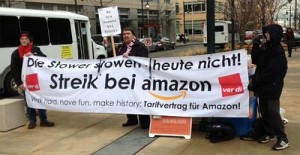LOCAL
Amazon CEO Bezos ‘would not survive’ in own warehouse
 SEATTLE (Dec. 17, 2013) — Could Amazon CEO Jeff Bezos survive for one week in one of his company’s own warehouses? That’s the question Nancy Becker, an American employed by Amazon in Germany since 2001, asked as she trekked to Seattle this week to stand up for the rights of workers in the online retailer’s “fulfillment centers.” The centers — little more than warehouses where workers are faced with near-impossible workloads for minimal pay — were the subject of a rally in Seattle and another in a series of rolling one-day strikes Germany on Monday.
SEATTLE (Dec. 17, 2013) — Could Amazon CEO Jeff Bezos survive for one week in one of his company’s own warehouses? That’s the question Nancy Becker, an American employed by Amazon in Germany since 2001, asked as she trekked to Seattle this week to stand up for the rights of workers in the online retailer’s “fulfillment centers.” The centers — little more than warehouses where workers are faced with near-impossible workloads for minimal pay — were the subject of a rally in Seattle and another in a series of rolling one-day strikes Germany on Monday.
“I’m coming to Seattle to dare Jeff Bezos to try working as a picker for a single week,” said Becker, who traveled from her workplace in Germany. “I’m sure he would not survive.”
 In recent months, workers at Amazon’s warehouses in Bad Hersfeld, Leipzig and Graben in Germany have engaged in a series of rolling one-day strikes. They hope that Monday’s protest at the company’s Seattle headquarters will increase pressure on Amazon to raise wages. They were joined Monday by dozens of American workers also opposed to the low wages and harsh work conditions that the company’s American warehouses share.
In recent months, workers at Amazon’s warehouses in Bad Hersfeld, Leipzig and Graben in Germany have engaged in a series of rolling one-day strikes. They hope that Monday’s protest at the company’s Seattle headquarters will increase pressure on Amazon to raise wages. They were joined Monday by dozens of American workers also opposed to the low wages and harsh work conditions that the company’s American warehouses share.
AFL-CIO President Richard Trumka said:
We welcome the German Amazon workers and their union, ver.di, to the United States. Just as German workers have stood in support of U.S. workers employed by global corporations, we join your fight for fairness at one of the largest corporate retailers in the world. It’s time that Amazon make good on its obligations to its workers, not just its shareholders and executives, and we will be there in Seattle to make our voices heard.
The complaints about Amazon are pretty similar in both countries.
“The Amazon system is characterized by low wages, permanent performance pressure and short-term contracts,” said Stefanie Nutzenberger, a board member of ver.di, the union representing the German Amazon workers. Instead of classifying fulfillment center workers as retail employees, the company calls them “logistics” workers and then pays them lower rates than they would have to pay retail workers. This misclassification allows the company to claim that it’s paying workers a higher wage for their field than other companies, when the reality is they would have significantly higher wages if correctly classified as retail workers. And despite claims that Amazon has made about safety being a top priority, “Last month, an investigation by the BBC’s “Panorama” program into a U.K.-based Amazon warehouse found conditions a stress expert said could cause ‘mental and physical illness.'”
Workers categorized the conditions similarly:
“The workers are treated more as robots than human,” Markus Hoffmann-Achenbach, an organizer for Ver.di at the Amazon warehouse in the city of Werne, said by email. He was on his way to Seattle to participate in the demonstration.
“As a worldwide company,” Mr. Hoffmann-Achenbach added, “Amazon should treat their workers fairly and with respect in every country. The solidarity of American unions and ver.di, the united services union of Germany, is a sign that social movements are not bounded by national borders and that in times of globalization, the workers worldwide stand together as one.”
AFL-CIO Now contributed to this report.





